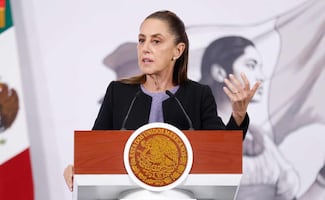Más Información

Harfuch destaca captura de más de 60 objetivos por Operativo Enjambre en Michoacán; hay presencia de más de 15 mil elementos

FGR: Diego Rivera secuestró a candidatos morenistas en 2021; así operaba la red criminal del alcalde en Tequila, ligada al CJNG

ONU alerta sobre posibles maltratos en centros mexicanos para tratar adicciones; "operan sin regulación", señalan expertos

Captan momento en que le limpian los zapatos a Hugo Aguilar; "hecho no representa actuar de la Corte ni como me conduzco", responde

Dictan prisión preventiva al papá de "El Tortas", exlíder de la Anti Unión Tepito; lo acusan de delitos contra la salud
Former rivals Hillary Clinton and Bernie Sanders urgently joined forces Monday to tamp down dissent among his supporters, as Democrats tried to keep infighting from overtaking a convention opening night featuring some of the party's biggest stars.
It was unclear whether the efforts would succeed. Chants of "Bernie" echoed through the arena, and boos could be heard at times when Clinton's name was raised. Outside the arena, several hundred Sanders backers marched down Philadelphia's sweltering streets. Signs carried messages such as "Never Hillary" and even in one case "Just go to jail, Hillary," an echo of the Republicans' "Lock her up."
Much of Monday's program appeared aimed at giving Sanders' backers an opportunity to express their frustration before the convention moved on to focus on speakers who strongly support Clinton, such as first lady Michelle Obama. Sanders was delivering the night's closing address, just after Massachusetts Sen. Elizabeth Warren, who was expected to give a fervent address in favor of Clinton as well as denouncing Trump.
For Clinton, it was a turbulent start to a historic four-day gathering that will culminate in the nomination of the first woman to lead a major U.S. political party. It also sapped some of her energy coming out of Republican Donald Trump's chaotic convention last week and the well-received rollout Saturday of her running mate, Virginia Sen. Tim Kaine.
Sanders scored a major victory with the forced resignation of party chair Debbie Wasserman Schultz following the release of emails showing her staff favored Clinton during the primary despite vows of neutrality. But Sanders' aides reached out to the Clinton campaign Monday afternoon to express concerns that the chairwoman's ouster wouldn't be enough to keep supporters from disrupting the convention, according to a Democratic official.
The discussions between the two camps prompted Sanders to send emails and text messages to supporters asking them not to protest.
"Our credibility as a movement will be damaged by booing, turning of backs, walking out or other similar displays," Sanders wrote.
Moments after the convention opened in Philadelphia, the DNC also apologized to Sanders and his backers "for the inexcusable remarks made over email." The statement was signed by DNC leaders, though Wasserman Schultz's name was notably absent.
The Florida congresswoman's resignation is effective later this week, though she also stepped down from her official convention duties. The mere sight of her on stage had been expected to prompt strong opposition from Sanders' backers.
Sanders was a relatively unknown Vermont senator when he decided to challenge for the Democratic nomination. He stunned the Clinton campaign with his broad support among young people and liberals, as well as his online fundraising prowess. But he struggled to appeal to black voters and couldn't match the former secretary of state's ties to the Democratic establishment that wields significant power in the primary process.
Sanders previewed his remarks during an appearance earlier Monday before supportive delegates. He implored them to vote for Clinton, generating a chorus of boos.
"Brothers and sisters, this is the real world that we live in," Sanders said as he tried to quiet the crowd. "Trump is a bully and a demagogue."
Clinton is promising a stark contrast to last week's Republican gathering, an often chaotic affair that featured a heavy dose of pessimism about the economy and national security.
"I don't see how you run for president of the United States if you spend all your time trash-talking the United States," she told supporters at a rally in North Carolina. "We're going to have a convention this week that highlights success stories."
The controversy over some 19,000 leaked DNC emails, however, threatened to complicate those plans. The correspondence, posted by WikiLeaks over the weekend, showed top officials at the supposedly neutral DNC favoring Clinton over Sanders in the presidential primaries.
Clinton campaign officials blamed the hack, which is now being investigated by the FBI, on Russian military intelligence agencies. The campaign also accused Moscow of trying to meddle in the U.S. election and help Trump, who has said he might not necessarily defend NATO allies if they are attacked by Russia.
Trump dismissed the suggestion in a tweet: "The joke in town is that Russia leaked the disastrous DNC emails, which should never have been written (stupid), because Putin likes me."
A cybersecurity firm the Democrats employed found traces of at least two sophisticated hacking groups on their network - both of which have ties to the Russian government. Those hackers took at least a year's worth of detailed chats, emails and research on Trump, according to a person knowledgeable of the breach who wasn't authorized to speak publicly about the matter.
Noticias según tus intereses
[Publicidad]
[Publicidad]









